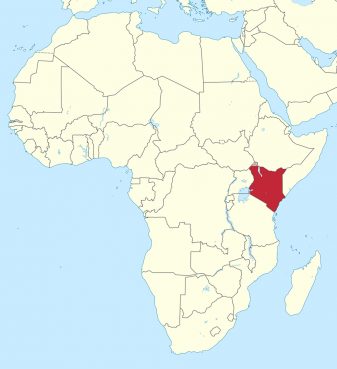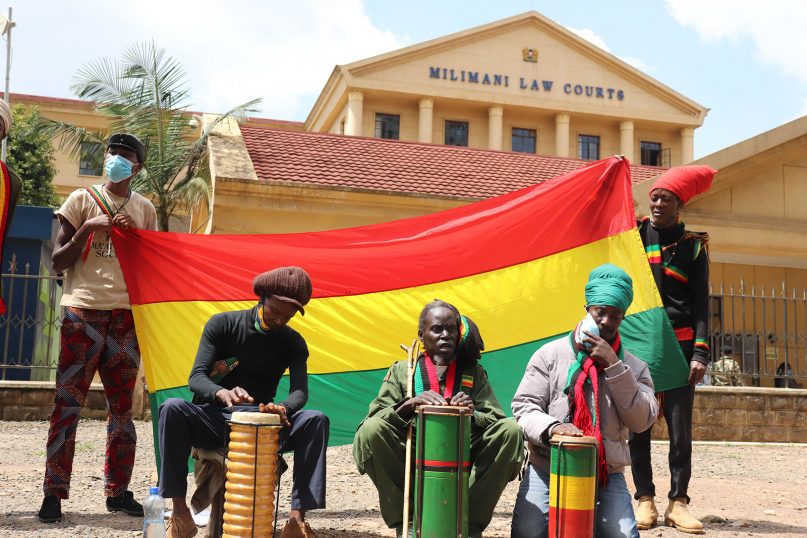NAIROBI, Kenya (RNS) — Rastafarians have petitioned the Kenyan high court to decriminalize the use of cannabis, claiming that smoking marijuana is part of their religious practice.
“We Rastafari, who have been stigmatized and misunderstood, we have come here to say in agreement with the United Nations that the use of cannabis for cultural, spiritual and medicinal should be allowed for people who (have) been using it for many years,” Ras Lorjoron, the chairman of the Rastafarian Society of Kenya, told journalists Monday (May 17) outside the court, where the Rastafarians demanded legal use of the plant in their houses and places of worship.
In December, a United Nations commission voted to remove cannabis from its list of deadly drugs, while still calling it harmful.
RELATED: Rastafarianism, promising freedom, spreads among African youth
“Many parts of the world have come to debate and allow the use for spiritual, health and cultural purpose,” Lorjoron added.
Smoking marijuana, say followers of the Rastafarian movement, is their way of connecting with their God, Jah. The “holy herb,” they maintain, heightens their feeling of community and helps them reach a spiritual realm.
According to Lorjoron, the Rastafarians in Kenya are frequent targets of arrest by the police and persecution for the spiritual use of cannabis, especially for sacramental purposes. Many of them end up growing the plant secretly in forests, home compounds or pots inside their homes.
“We urge you to help remove the stigma around cannabis. We want the world to no longer see it as a narcotic, but a medical plant that can help the creation,” said Lorjoron.

Kenya, red, located in eastern Africa. Map courtesy of Creative Commons
In the petition, the group requested changes to sections of the Kenyan Constitution that classify cannabis as a narcotic drug and psychotropic substance. The sections, according to the group, discriminate against the Rastafarian community on the basis of religion.
The origins of Rastafarianism can be traced to the island nation of Jamaica in the Caribbean, but it gained momentum in 1930, when Emperor Haile Selassie of Ethiopia in the Horn of Africa came to power, and some in the movement came to believe Selassie was an incarnation of God. His coronation triggered an exodus to Ethiopia from the Caribbean. Followers of the faith are currently found in most countries in Africa.
The numbers are small in Kenya, where 83% are Christians and 10% are Muslims, according to a 2013 Kenya National Bureau of Statistics study.
Representatives of the movement made their petition at the same court where, in 2019, a judge declared their movement a religion.
Some leaders of more established faiths expressed their doubts. “They are one of those emerging to claim their space,” Roman Catholic Bishop Wilybard Lagho, who heads the Diocese of Malindi, told Religion News Service. “We have a liberal constitution that allows freedom of religion, but I am not sure if they qualify to be a religion.
“I think it’s more of a philosophical question more than a legal one, whether any group can rise up and use a drug as a holy herb, ” added Lagho.
Although there have been some lonely voices in the past calling for decriminalizing the smoking of cannabis in Kenya, the latest move has perturbed Christian and Muslim leaders.
“It would be a big blunder to legalize it, given that millions of Kenyan youth who are unemployed. The stressed youth would smoke to find solace and it would be total mess,” said the Rev. Joachim Omollo Ouko, an Apostle of Jesus priest in the Archdiocese of Kisumu in western Kenya.
Abdallah Kheri, a religious scholar who chairs the Islamic Research and Education Trust, said anything that harms the body is forbidden in Islam.
“Bhang affects the people’s well-being, so it’s forbidden,” said Kheri, using another word for cannabis. “We are still struggling with drug abuses in the country, and if it’s legalized we’ll keep losing generations.”





